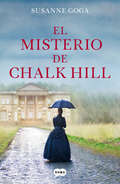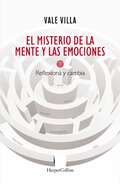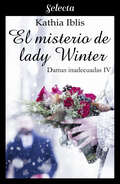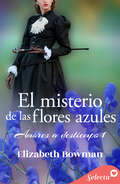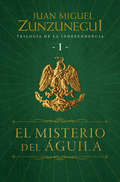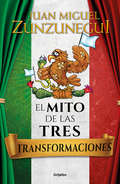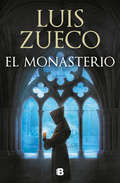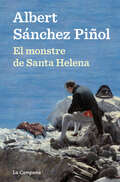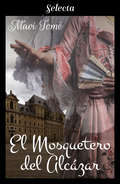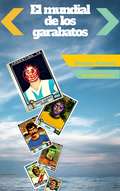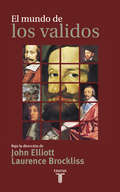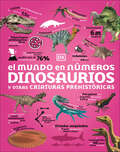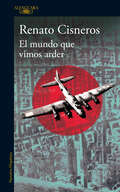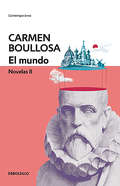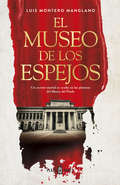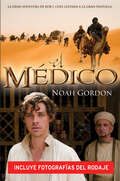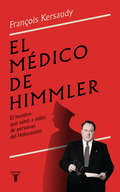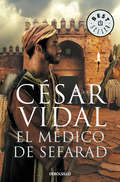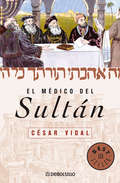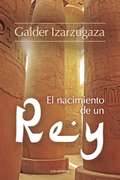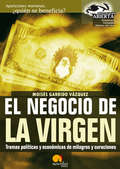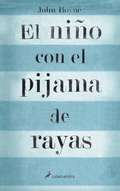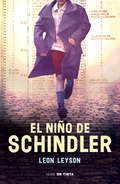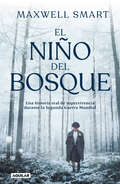- Table View
- List View
El misterio de Chalk Hill
by Susanne GogaIntriga y sentimientos se entrelazan en una historia romántica y misteriosa que emocionará a los lectores de Kate Morton y Charlotte Brontë. Una majestuosa casa señorial en la campiña inglesa.Un secreto que no debe ser descubierto. La primera vez que Charlotte se encuentra frente a la hermosa mansión de Chalk Hill, en las verdes colinas de Surrey, se queda sin aliento: la imponente villa, coronada por una torre y rodeada de árboles centenarios, es el lugar más fascinante que ha visto nunca. Allí confía en comenzar una nueva vida tras haber tenido que abandonar Berlín por un escándalo que ha comprometido su reputación como institutriz. Ha sido llamada para cuidar a la pequeña Emily, pero pronto Charlotte se da cuenta de que una extraña atmósfera se cierne sobre la casa: el silencio es casi irreal, el padre de Emily se muestra frío y reservado y la niña sufre terribles pesadillas desde la trágica desaparición de su madre. Preocupada por el bien de Emily, trata de averiguar más acerca de la muerte de Lady Ellen, pero nadie en Chalk Hill parece preparado para romper el silencio. Solo con la ayuda del periodista Thomas Ashdown, Charlotte podrá enfrentarse a la oscura verdad que esconden sus antiguos muros. La crítica ha dicho...«Una historia apasionante que captura maravillosamente el estilo de la aristocracia inglesa.»Für Sie «Esta novela no solamente trata de un río; es ella misma un río... Su refinada narración fluye cautelosamente, acompañada por corrientes profundas, oscuras y asombrosas.»Rheinische Post «Una novela de potente atmósfera ambientada a finales del siglo XIX con personajes principales muy bien perfilados que cautiva constantemente y proporcionará horas de placentera lectura.»Histo-couch.de «Una novela histórica repleta de secretos... Si existe un premio al suspense y elmisticismo, desde luego este libro tiene lo que se necesita.»Radio Arabella
El misterio de la mente y las emociones: Reflexiona Y Cambia (reflect And Change)
by Vale VillaEl consejo no es la esencia de la psicoterapia, pero sí la reflexión acompañada que permita a las personas encontrar respuestas dentro de sí mismas. También la clarificación de los sentimientos, que incide en la capacidad para enfrentar todas las circunstancias con más conciencia y fortaleza. Los grandes y pequeños temas de la vida cotidiana pueden estudiarse teóricamente y observarse empíricamente: el amor y el desamor, el inconsciente, el duelo, la depresión, la ansiedad, la autoestima, la infidelidad, la ira, la timidez, las nuevas masculinidades, el nuevo feminismo, la pornografía, la diversidad sexual y afectiva, la soltería como elección, las capacidades que nos fortalecen como personas y que hacen la vida más fácil. Todo abordado y comprendido desde la psicología, la literatura y la filosofía.X
El misterio de lady Wynter (Damas inadecuadas #Volumen 4)
by Kathia IblisKathia Iblis vuelve con la esperada cuarta entrega de la fascinante serie «Damas inadecuadas». ¡No podrás dejar de leer! Lady Seraphine Wynter, baronesa viuda de Vaux de Harrowden, finalmente se ha librado de un matrimonio infernal y ha hallado su camino a Londres. No obstante, a pesar de la distancia, descubre que todos sus secretos y misterios la han seguido a la capital inglesa. Y uno en especial que podría cambiar para siempre su destino. Dáire Ruah Chichester, tercer hijo del marqués de Donegall, tan solo desea enorgullecer a su familia y cumplir sus sueños como miembro de Scotland Yard. Sin embargo, jamás esperó conocer a un bello ángel herido cuya mirada se ha quedado grabada a fuego en su alma. Pero cuando sus caminos se cruzan sus destinos parecen determinados a enlazarse. ¿Podrán las sombras del pasado oscurecer su naciente amor?
El misterio de las flores azules (Amores a destiempo #Volumen 1)
by Elizabeth BowmanElla viajó en el tiempo buscando desesperadamente su lugar en el mundo, sin comprender que, al salvarse a sí misma, también le estaba salvando a él. Eloíse Harley es una joven de estética gótica e inclinaciones wiccanas que no acaba de encajar en el mundo. Huérfana desde muy pequeña, tímida, reservada, solitaria y de excéntrico exterior, siempre ha sido una incomprendida. Su única amiga en el mundo es lady Coverdale, la anciana tarotista que dos años atrás le ha ofrecido empleo en su tienda esotérica para ejercer en su vida el rol de abuela. Mathew Osbourne es un caballero taciturno y melancólico. Sobre su apellido ha caído la sombra de la desgracia. Su padre, recién desposado en segundas nupcias con una mujer que a ningún miembro de la familia agrada, fallece de un ataque al corazón después de semanas enfermo. Poco después fallece su querida esposa, y su propia hermana Seline es también arrancada del hogar familiar para serencerrada en un sanatorio. En medio de su abominable tristeza y soledad, Mathew lucha con los sentimientos de culpa e impotencia. Una abuela dispuesta a todo por salvar a los que quiere, un conjuro llevado a cabo en una noche mágica, un viaje a través del tiempo, el anhelo de Eloíse de encontrar desesperadamente su lugar en el mundo, la necesidad de Mathew de aliviar el sentimiento de culpa que ensombrece su alma, una mujer malvada dominada por el deseo de venganza y unas misteriosas flores azules que parecen ser el centro de la negra sombra de los Osbourne.
El misterio del águila (Trilogía de la Independencia #Volumen 1)
by Juan Miguel ZunzuneguiUna pareja es descubierta en la conspiración contra la corona española en 1799. A punto de morir entregan a su hija Sofía al padre José María Morelos, junto a una medalla de un águila con las alas extendidas. Esta mujer será protagonista de los acontecimientos más importantes de su tiempo. El misterio, la historia y la pasión unidas en una saga trepidante. Una trilogía de aventuras y amor, arrebatadora, tierna, épica... que desmitifica a los grandes héroes históricos de México. El misterio del águila narra una apasionada historia de amor, la de Sofía y Miguel, en plena guerra de independencia. Rivales en sus idealismos y en sus orígenes, viven separados por la contienda, pero la develación de una antigua conspiración jesuita cambia todo: sus enigmáticos linajes, los de Moctezuma y Hernán Cortés, quedan al descubierto. Y ello los unirá... El capitán realista Miguel de Montellano y la hermosa mestiza Sofía Guillén, infiltrada en las tropas insurgentes, deberán superar los obstáculos que los separan; no sólo la confrontación, sino el rencor histórico y social, además de un pasado oculto por el que los jefes del ejército realista están dispuestos a matar. Desde el siglo XVII y hasta la guerra de independencia, una historia de aventuras, misterio, amor, lucha, ideales, conspiración y traiciones nos devela un secreto relacionado con el origen de México que los protagonistas deberán descubrir para lograr unirse, y tal vez poner fin al conflicto...
El mito de las tres transformaciones
by Juan Miguel Zunzunegui«El que controla el pasado controla el futuro, y el que controla el presente es quien controla el pasado.» George Orwell, 1984 La historia no estudia el pasado, lo construye. Toda historia nacional es una mitología, y las mitologías sirven para estructurar la mente de un pueblo. La historia ha sido un arma, una herramienta política, un discurso psicológico, y eso es así porque siempre se ha escrito desde el poder para legitimarlo. Hoy se habla de transformaciones en la historia de México: independencia, reforma y revolución. Todas implicaron guerra, polarización y odio; cada una de ellas generó división y sembró las semillas de los conflictos posteriores. Para transformar a México, hay que tener un cambio colectivo de mentalidad, y con el bien común como premisa indispensable para encontrar la paz. El mito de las tres transformacioneses un paseo a lo largo de la historia y la psicología de nosotros mismos para lograr una verdadera transformación y construir el mejor México posible.
El monasterio (Trilogía Medieval #Volumen 3)
by Luis ZuecoUn thriller histórico de máximo suspense ambientado entre los muros de uno de los monasterios medievales más impresionantes de España. Tercera entrega de la aclamada Trilogía Medieval de Luis Zueco. El monasterio de Santa María de Veruela aspiraba a ser una ciudad celeste, reflejo del reino de los cielos… pero sus muros fueron testigos de historias de ambición, traición y venganza. En el siglo XIV es escenario de una cruenta guerra entre las coronas de Castilla y Aragón. Hasta allí llega Bizén con una misión: recuperar los restos que yacen en una de sus tumbas, algo a lo que el abad se niega. Pero cuando uno de los hermanos de la abadía aparece misteriosamente asesinado, Bizén se verá implicado en una muy peligrosa intriga… Porque si no encuentra al culpable, su propio secreto será descubierto. La crítica ha dicho sobre El monasterio...«La ambientación espacio-temporal, una vez más, es magnífica. Luis Zueco es un maestro a la hora de describir escenarios y de situar sus novelas en el tiempo y en espacio, trasladando allí al lector.»Libros que hay que leer«Con El monasterio (2018), Zueco ha logrado dar un paso más adelante y crear una obra redonda, con un ritmo endiablado. Donde, como siempre, logra conjugar el suspense, la historia, las batallas, intrigas; con unas tramas apasionantes y unos diálogos afilados y para enmarcar.»Novelashistóricas.com«Una novela que no hay que dejar escapar. Comparada con las anteriores, El castillo y La ciudad, mantiene la tónica de calidad.»Anika entre librosLa crítica ha dicho sobre el autor y sus obras anteriores, El Castillo y La Ciudad... «La mejor novela histórica de 2015.»Novelas Históricas «En la estela de Los pilares de la tierra y La catedral del mar.»La Vanguardia «Si uno quiere trasladarse a la Edad Media, el castillo de Loarre es la mejor máquina del tiempo.»El Mundo «¡Recomendadísima!»Librería General «Hace mil años se erigió en el Pirineo aragonés una colosal fortaleza. Luis Zueco novela cómo se llevó a cabo esta proeza y da respuesta a algunos enigmas aún sin resolver.»ABC «Sus páginas están repletas de peripecias, de idilios y de lances bélicos.»Heraldo de Aragón «Una extraordinaria novela.»SER «Una de las novelas históricas con más enganche.»20 minutos «Una novela que pone en valor una de nuestras joyas patrimoniales: Loarre.»El Periódico de Aragón «La novela histórica más impactante del año.»Librería Serret Llibres «Mezcla los datos históricos con tramas de mucha intriga, como si de un thriller se tratase.»El Placer de la Lectura «Magníficaambientación.»Entre mis libros y yo «Uno de los escritores de novela histórica más importante del país. Mezcla sabiamente personajes históricos con otros ficticios, dando a la trama una tensión trepidante.»Todo Literatura «Un trepidante thriller histórico. La Historia aquí no es mero paisaje, sino que es elemento de suspense.»20 minutos«Si la primera obra que escribió Zueco de esta trilogía, El castillo, ambientada en el de Loarre (Huesca), es una novela puramente histórica, este segundo libro, La ciudad, incorpora al rigor histórico el thriller.»La Vanguardia
El monasterio (Trilogía medieval #Volumen 3)
by Luis ZuecoUn thriller histórico de máximo suspense ambientado en un fascinante escenario medieval, entre los muros de uno de los monasterios medievales más impresionantes de España. El silencio oculta la verdad. Pero hasta las mejores mentiras terminan por descubrirse. El monasterio de Santa María de Veruela aspiraba a ser una ciudad celeste, un fiel reflejo del reino de los cielos, pero lo cierto es que lo habitaban simples mortales. Sus muros fueron testigos de historias de ambición, traición y venganza. Y también de amor, sexo y... muerte. En las mágicas y misteriosas tierras del Moncayo se asienta uno de los monasterios cistercienses más bellos del mundo. En el siglo XIV es escenario de una cruenta guerra entre las coronas de Castilla y Aragón, y hasta allí llega el joven Bizén con una misión que cumplir: recuperar los restos que yacen en una de sus tumbas, algo a lo que el abad se niega por misteriosas razones. Pero cuando uno de los hermanos de la abadía aparece asesinado en misteriosas y violentas circunstancias, Bizén se verá implicado en una intriga de peligrosas ramificaciones. Y deberá concentrarse en hallar al culpable si no quiere que su propio secreto sea descubierto. La crítica ha dicho sobre el autor y sus obras anteriores, El Castillo y La Ciudad... «La mejor novela histórica de 2015.»Novelas Históricas «En la estela de Los pilares de la tierra y La catedral del mar.»La Vanguardia «Si uno quiere trasladarse a la Edad Media, el castillo de Loarre es la mejor máquina del tiempo.»El Mundo «¡Recomendadísima!»Librería General «Hace mil años se erigió en el Pirineo aragonés una colosal fortaleza. Luis Zueco novela cómo se llevó a cabo esta proeza y da respuesta a algunos enigmas aún sin resolver.»ABC «Sus páginas están repletas de peripecias, de idilios y de lances bélicos.»Heraldo de Aragón «Una extraordinaria novela.»SER «Una de las novelas históricas con más enganche.»20 minutos «Una novela que pone en valor una de nuestras joyas patrimoniales: Loarre.»El Periódico de Aragón «La novela histórica más impactante del año.»Librería Serret Llibres «Mezcla los datos históricos con tramas de mucha intriga, como si de un thriller se tratase.»El Placer de la Lectura «Magnífica ambientación.»Entre mis libros y yo «Uno de los escritores de novela histórica más importante del país. Mezcla sabiamente personajes históricos con otros ficticios, dando a la trama una tensión trepidante.»Todo Literatura «Un trepidante thriller histórico. La Historia aquí no es mero paisaje, sino que es elemento de suspense.»20 minutos
El monstre de Santa Helena
by Albert Sánchez Piñol¿Què s'esdevindria si reuníssim en una mateixa habitació l'Amor, la Cultura i el Poder? Mai un home ha estat reclòs en una presó més segura, més llunyana i més inexpugnable que Napoleó Bonaparte després de ser derrotat a Waterloo. Tothom sap què li va passar: que el món, fart de les seves ambicions infinites i les destrosses inacabables, va decidir tractar-lo com el que era… Un geni del mal. I la llàntia on el van tancar es deia Santa Helena: un illot de roca a milers de quilòmetres de la costa més propera, infestat de rates i vigilat per l'armada britànica. La primavera del 1819, François-René de Chateaubriand i la seva amant, Delphine Sabran, s'embarquen rumb a aquesta illa perduda al bell mig de l'oceà. El gran escriptor del segle i la marquesa de Custine volen posar a prova el seu amor superant dos grans obstacles: una gran distància i un gran adversari, com han fet les parelles més cèlebres de la història, des deMarc Antoni i Cleòpatra a Romeu i Julieta. Després de mesos de navegació, ¿a quin adversari més temible que Napoleó es poden enfrontar aquests fills de l'aristocràcia francesa? Però en la seva trobada amb l'emperador que va conquerir tot Europa, el militar a qui respectaven fins i tot els seus enemics, l'home davant del qual es rendien les dones..., Chateaubriand i Delphine descobriran amb horror que els monstres poden tenir molts rostres.
El mosquetero del Alcázar
by Mavi ToméSegunda entrega de la bilogía «La menina y el mosquetero», cuya historia sucederá dos meses después de los hechos transcurrido en La menina del Louvre. Romance y aventura en una novela trepidante. Breda está rodeada... Inglaterra ha atacado Cádiz... Francia permanece neutral... Dos meses después de los sucesos de La Menina del Louvre, Felipe IV llama a su presencia a Aurora y a Philippe para pedirles cuentas por la muerte de don Álvaro de la Quadra, más los mellizos tienen misiones diferentes: Philippe custodia a una embarazada Ana de Austria, cada vez más perdida en sus ensoñaciones con el fascinante duque de Buckingham; Aurora, por su parte, viaja a las Españas en compañía de Artal y Philippe. Porta un anillo en su dedo, más no es de boda de lo que quiere hablar: su vida, sus orígenes, se encuentran ocultos tras el velo del misterio. ¿Quién es ella? ¿Por qué su rostro aparece en un retrato? Y de telón de fondo, la guerra... El sol de Breda pretende separar a los mellizos. Los gemelos se buscan mutuamente. Mal haya en quien pretenda separarlos.
El mundial de los garabatos
by Stefano PaolocciSe está disputando el mundial de fútbol de 1978. Durante los partidos en la playa, Guillermo se divierte personificando a los jugadores que en esos días enloquecen los diarios y las televisiones. Copiando sus movimientos, imitando las voces de los comentaristas de radio y televisión, Guillermo alimenta la envidia de sus compañeros, transformándose en el blanco de sus desprecios y mezquinas venganzas, como el castigo ideado por Alfredo: cada vez que Guillermo interpreta a un jugador, la figurita correspondiente es arrancada del álbum y garabateada con una lapicera, o cortada, para luego ser atada con hilo y enganchada en un barrilete hecho en casa. Una historia para comprender el régimen militar en Argentina y el drama de los desaparecidos.
El mundo de los validos
by John H. Elliott Laurence BrocklissUn magnífico ensayo sobre el fascinante papel del valido en la Europa de la era moderna. En los siglos XVI y XVII observadores ingleses, españoles, franceses y de otras naciones europeas se mostraban alarmados ante la creciente influencia de los validos, favoritos o ministros-favoritos. Estos personajes parecían estar usurpando competencias y obligaciones normalmente ejercidas por los monarcas. En este libro pionero, un grupo de ilustres historiadores internacionales -entre los que figuran Laurence Brockliss, Jonathan Brown, John H. Elliott, Antonio Feros, Marc Fumaroli y I.A.A. Thompson- analiza la figura de los favoritos y su ascenso en Europa. Los diversos colaboradores de esta obran ahondan en el fenómeno de estos poderosos personajes, indagando más allá de las ya conocidas vidas de algunos de ellos como el duque de Buckingham, el cardenal Richelieu o el conde-duque de Olivares. ¿Fue su aparición en el escenario europeo simple coincidencia? ¿Cómo puede explicarse este hecho? ¿Cómo lograban y retenían su dominio sobre los resortes del poder? ¿Cuál era su relación con su regio señor? ¿Y por qué optaron gradualmente los soberanos por gobernar sin favoritos en las postrimerías del siglo XVII?
El mundo en numeros: Dinosaurios (DK Oour World in Numbers)
by DKAprende cifras increíbles y descubre datos alucinantes sobre la vida de los dinosaurios en cada página con este divertido libro ilustrado de dinosaurios y animales prehistóricos. ¿Cómo era la mordedura de un cronosaurio? ¿Cuánto pesaba el dinosaurio más pequeño? ¿Sabías que los placodermos fueron los primeros animales en tener abdominales?Desde las dinosaurios más rápidos, grandes y letales hasta el tamaño de sus corazones, cerebros y colas, aprende divertidas curiosidades sobre tus dinosaurios favoritos y sorprende a tus familiares y amigos con datos asombrosos.Una enciclopedia juvenil visual y diferente para aprender de forma divertida donde encontrarás:Información sorprendente sobre la prehistoria y las especies de dinosaurios y animales que habitaron el planeta.Llena de números, gráficos y fotos a todo color para divertirse aprendiendo.Incluye páginas que muestran los Top 5 con las cifras récord de cada especie: los 5 cocodrilos más grandes del mundo, los 5 dinosaurios con el cuello más largo, o los 5 pterosaurios con las alas más grandesDividida en cinco capítulos en base a la escala temporal geológica: antes de los dinosaurios, Triásico, Jurásico, Cretácico y después de los dinosaurios.Organizada de manera intuitiva y accesible, para que la información sea fácil de encontrar y de aprenderSi disfrutas conociendo datos y cifras sorprendentes, con El mundo en números: Dinosaurios ¡la diversión está asegurada! Un interesante libro que pone al alcance de tu mano todas las estadísticas y curiosidades que puedas imaginar... ¡y mucho más! El regalo perfecto para disfrutar en familia y con tus amigos. _________________________________________________________________________________Go on a fact-packed adventure through the prehistoric world with this children’s book of figures and number-based facts!Put the fun back into learning and take children on a number-crunching journey through dinosaurs and prehistoric life. From incredible ichthyosaurs to terrifying tyrannosaurus and everything in between, learn all about the age of the dinosaurs with more than 1,000 mind-blowing numbers.Our World in Numbers: Dinosaurs will have you impressing your family and friends with mind-blowing facts and stats on a vast range of different dino species. Children aged 9-12 will number-crunch their way around the prehistoric world, discovering everything from the fastest, biggest, and deadliest creatures to the size of dinosaurs' hearts, brains, tails, and scales.
El mundo que vimos arder
by Renato Cisneros"Es aberrante el modo en que uno se acostumbra a coexistir con la degradación: la ves a diario, te parece normal, a veces incluso la justificas. La guerra hace que lo repugnante se vuelva adecuado, ¿hay algo más inhumano que eso?". Luego de separarse de su esposa, un periodista peruano regresa a España dispuesto a rehacer su vida. Varias décadas antes, otro peruano, Matías Giurato Roeder, se encuentra en una situación similar: abandona su país para irse a Estados Unidos y experimenta los rigores de la migración y el horror de la Segunda Guerra Mundial. La experiencia civil y la aventura épica se complementan así en esta vibrante novela en cuya trama restallan los perturbadores efectos del amor, la locura, la política y la guerra. Dotada de una prosa trepidante que traslada al lector al vértigo y la crudeza de un campo de batalla, El mundo que vimos arder constituye tanto un registro bélico impactante como una reflexión sobre la identidad y el desarraigo en un tiempo en el que todo parece estar a punto de estallar o desaparecer.
El mundo: Novelas II (Biblioteca Carmen Boullosa #Volumen)
by Carmen Boullosa«Considerada una de las figuras más fascinantes de una nueva generación de autores latinoamericanos, Boullosa justifica los elogios con la riqueza de su obra» Publishers Weekly En esta segunda recopilación, Carmen Boullosa, una de las voces más importantes de la nueva ficción de América Latina, abandona «la seguridad del jardín de la infancia» -en palabras de Christopher Domínguez Michael- y se interna en el universo de lo imaginario. Un territorio donde la Historia -de la indómita América colonial en Duerme y Son vacas, somos puercos, al Viejo Mundo de La otra mano de Lepanto; de la Europa renacentista en La virgen y el violín, a la Rusia donde inminentemente estallará la revolución de El libro de Ana- y sus personajes ceden a la posibilidad de ser recreados y adaptados al mundo improbable de la ficción, como un recurso parareinventar la realidad y comprender lo que realmente significa ser y estar en la piel de otros. La crítica y otros autores han opinado: "Si tuviera que escoger una cocina literaria para instalarme allí durante una semana, escogería la de una escritora... Viviría muy a gusto en la cocina de Silvina Ocampo, en la de Alejandra Pizarnik, en la de la novelista y poeta mexicana Carmen Boullosa, en la de Simone de Beauvoir" Roberto Bolaño. "Como ella misma, las novelas de Carmen Boullosa son alucinantes, lúcidas, inquietas, inteligentes. Convierte constantemente su narrativa hasta llegar a una zona poética. Su literatura crea imágenes vívidas con grandes miradas a un sinnúmero de experiencias" Susanna Fischer "En su poesía hay una fuerza narrativa constante, como en su narrativa una impronta poética" Carlos Monsiváis. "Se puede deducir que para Boullosa la literatura es una suerte de conjuro, una forma de exorcizar esta suciedad fantasmal que tiene su origen en las instituciones, en la escuela, en la familia, en la iglesia" Jean Franco "La escritura de Carmen Boullosa consigue que imaginemos y habitemos esos límites sin remedio quebradizos" Juan José Reyes, Letras Libres. Sobre Son vacas, somos puercos: "Boullosa es una escritora con una envidiable y compulsiva capacidad para escribir y hacerlo bien. En Son vacas, somos puercos, penetra en el lenguaje del siglo XVII sin imitación servil del barroco, pero con un jugueteo constante con sus trampas, logrando una densidad prosística escasa en la literatura mexicana de hoy. [...] Boullosa trabajó como los buenos novelistas: con calma porque tienen prisa" Christopher Domínguez Michael "Picaresca oscura... Boullosa evoca con maestría la sangrienta realidad de los piratas del siglo XVII" Entertainment Weekly "Una novela picaresca embriagada de palabras... las descripciones vívidas y viscerales de Boullosa ofrecen imágenes alucinatorias del saqueo y pillaje de los piratas, así como de sus batallas en la jungla y en el mar" New York Times Book Review
El museo de los espejos
by Luis Montero ManglanoUn secreto mortal se oculta en las pinturas del Museo del Prado. Un buen cuadro no es más que un espejo En el año del bicentenario del Museo del Prado, las celebraciones se ven drásticamente alteradas por una serie de violentos asesinatos que reproducen algunas de las pinturas más famosas que allí se exponen. Una copista aficionada y un estrafalario experto en simbología serán los únicos capaces de resolver los crímenes. El museo de los espejos es un inquietante thriller que gira alrededor de una de las pinacotecas más importantes del mundo y de los misterios que encierran sus obras de arte. Presa de un ritmo narrativo endiablado, todo el que se sumerja en sus páginas viajará desde los despachos de los directivos del museo hasta los sótanos y almacenes, pasando por sus salas más famosas, y conocerá sorprendentes detalles sobre los cuadros inmortales que se exhiben ensus muros. Descubre en esta escalofriante novela cómo las obras de Velázquez, Goya o el Bosco esconden más secretos que los que podrías imaginar.
El médico (Trilogía de la familia Cole #Volumen 1)
by Noah GordonLa magistral historia de una vocación por la medicina que traspasará todas las fronteras. El extraordinario viaje que cambiará para siempre el rumbo de su vida. El médico, un clásico contemporáneo, es la primera entrega de la saga de la familia Cole, la obra cumbre de Gordon. Inglaterra, siglo XI. A sus nueve años, tras la muerte de su madre y la pérdida de su hogar, Rob J. Cole se da cuenta de que tiene un don extraordinario: con solo tocar a una persona puede descubrir si está o no cerca de la muerte. Bajo la tutela de Henry Croft, cirujano barbero que recorre el país ejerciendo de curandero, su don crece, así como su pasión por la medicina. Tras la muerte de su maestro, Rob continua con el negocio, pero el encuentro con Benjamin Merlin, un médico judío que le habla del más eminente doctor de la remota Persia, Ibn Sina o Avicena, le impulsa a hacer realidad su sueño. Movido por su pasión por sanar y dispuesto a superar cualquier obstáculo, Rob viajará a Oriente, haciéndose pasar por judío y sumergiéndose en nuevos idiomas, dispuesto a estudiar medicina en la madraza de Ispahán. Allí marcará su destino y el de su familia para siempre.
El médico de Himmler: El hombre que salvó a miles de personas del Holocausto
by François KersaudyLa verdadera historia de la lista de Kersten, un relato desconocido de terror, fanatismo, generosidad y heroísmo. Hasta las figuras más temibles de la historia tienen sus debilidades, y la de Heinrich Himmler fue sin duda su médico, cuyas manos milagrosas eran las únicas capaces de aliviar sus insoportables calambres abdominales. Felix Kersten, nacido en Estonia y formado por un maestro tibetano en Finlandia, era uno de los fisioterapeutas más prestigiosos de los años treinta, con una agenda internacional de pacientes y un buen patrimonio. En 1939, recibió la petición de atender a Himmler y, tras vencer sus dudas iniciales, se convirtió en su médico personal o, en palabras del Reichsführer, en su «Buda mágico». En lugar de recibir honorarios, pidió que le remuneraran mediante la liberación de judíos y combatientes de la resistencia. Todos conocemos a Oskar Schindler, que salvó a mil judíos durante la Segunda Guerra Mundial. Pero sabemos mucho menos de la hazaña de Kersten y, sin embargo, el Congreso Judío Mundial estableció en 1947 que este hombre había salvado en Alemania a «unos cien mil prisioneros de distintas nacionalidades, entre ellos sesenta mil judíos, arriesgando su vida», una cifra sin duda subestimada. Para seguirle los pasos a Kersten, François Kersaudy, gran especialista en la Segunda Guerra Mundial, se ha sumergido en diarios, notas y declaraciones en seis lenguas de los principales protagonistas, y emplea todo este material para narrar de un modo admirable esta trama sin un ápice de ficción. La crítica ha dicho: «Kersten no alcanzó una gloria similar a la de Schindler. ¿Por qué? Esta obra -rigurosa, minuciosa, implacable- le otorga un reconocimiento tardío».Le Point «Increíble pero cierto. Kersaudy conoce los misterios del régimen nazi como la palma de su mano, y le ofrece la consagración histórica a estehéroe a la vez grandioso y modesto».Le Figaro
El médico de Sefarad
by César VidalA mediados del siglo XII, el Mediterráneo constituía un mundo en tensión permanente: en Oriente, Saladino se preparaba para asaltar Jerusalén, y en Occidente los invasores almohades imponían su dominio en Al-Andalus. A mediados del siglo XII, el Mediterráneo constituía un mundo en tensión permanente: en Oriente, Saladino se preparaba para asaltar Jerusalén, y en Occidente los invasores almohades imponían su dominio en Al-Andalus. Justamente en esas tierras, en la ciudad de Córdoba, nació en el seno de una familia judía Moisés ben Maimón, médico y filósofo, conocido también como Maimónides. Fueron tiempos difíciles que obligaron a su padre, un respetado rabino, a emprender con su familia la ruta del exilio tras verse forzado a apostatar de su fe. Mientras seguimos a Moisés a través de los zocos y las escuelas de medicina, de las sinagogas y de los palacios, de los puertos y las ciudades de Al-Andalus, Marruecos, Tierra Santa y Egipto, se nos revela un cosmos de belleza, lucha y contrastes, donde sus habitantes (el talmudista, el médico árabe, los pacientes de Moisés, el propio Saladino y sobre todo Susana, la bella mujer de ojos verdes...), víctimas de los tiempos convulsos que les ha tocado vivir, anhelan conocer la sabiduría, encontrar el amor y descubrir el sentido último de la existencia.
El médico del sultán
by César VidalS. XII. Maimonides, médico y pensador judío cordobés se refugia en Egipto y se convierte en médico del Sultán Saladino. El siglo XII se acercaba agitadamente a su fin cuando Saladino, el paladín del islam, decidió asaltar los enclaves cruzados en Tierra Santa. Se trataba de una empresa colosal que no sólo chocaba con los obstáculos planteados por caballeros como los templarios y hospitalarios, sino también por las propias intrigas surgidas en los palacios de El Cairo. En medio de ese mundo en permanente tensión, en el que la guerra era una forma más de hacer política, emerge, como un faro de serena inquietud existencial, la figura de Moisés ben Maimón, también conocido como Maimónides, el médico, rabino y filósofo que se había exiliado de Sefarad y que buscaba la paz en el otro extremo del mundo. A través de las intrigas cortesanas y de los campos de batalla, de los lechos de los enfermos y de las disputas en las sinagogas, de laspesadillas y de los sueños de amor, Maimónides se convierte en nuestros ojos y nuestros oídos para visitar un microcosmos donde se entrecruzan guerreros, talmudistas, conspiradores, renegados y caballeros. Un mundo cuya configuración nadie puede escoger y en el que debemos encontrar la dicha y el significado de la vida. El médico del sultán es otra extraordinaria contribución de César Vidal al género de la novela histórica, que despliega ante el lector los entresijos de la corte egipcia, las Cruzadas, los deseos de supervivencia del pueblo judío y el gran campo de batalla en que se convirtió el Mediterráneo durante la Edad Media. Pero, sobre todo, constituye un homenaje a aquellos que se entregan a la búsqueda de la sabiduría, la felicidad y el amor.
El nacimiento de un rey
by Galder IzarzugazaEl camino de Narmer hacia el trono de las Dos Tierras. El Alto Egipto está unido bajo la autoridad de Serkhet, el Rey Escorpión, y afianza su presencia y su poder en el sur mientras un rebelde trata de apoderarse del trono. <P><P>Narmer crece a la sombra de su padre, su manera de gobernar y los planes de este para unir su reino con el centro de poder del norte, el Bajo Egipto. <P><P>¿Será capaz Narmer, con la ayuda de su esposa y reina Neithhotep, de derrotar al rebelde que pretende su reino y llevar a cabo los planes de conquista de su padre?
El negocio de la Virgen (Investigación Abierta)
by Moisés Garrido¿Es posible que se aparezca la Virgen? ¿Qué hay de verdad en el Tercer Secreto de Fátima? ¿Qué nos oculta la Iglesia? Y sobre todo, ¿qué intereses promueven estas apariciones y quién está tras ellos?… Desde tiempos ancestrales, los cultos aparicionistas han proliferado desatando a su alrededor auténticos movimientos sociales, en ocasiones descontrolados. Detrás de estos existen una serie de fenómenos extraños y, sobre todo, la abrumadora e inquebrantable fe de los miles de almas que peregrinan hasta esos lugares sintiendo en sus corazones la presencia de lo sobrenatural. Pero si la Virgen se aparece o no en los lugares que el autor refleja en esta ardua investigación de campo no es lo verdaderamente importante; junto a los supuestos milagros, estigmas y curaciones, aparecen las tramas financieras, la apología ultraderechista de algunos casos, y el interés económico de los negocios que subyacen tras estos movimientos. Lourdes, Garabandal, Guadalupe, El Palmar de Troya, Medjugorje… En definitiva, aquí se exponen las claves para dilucidar qué hay y qué se esconde tras el “lado oscuro” de María.
El niño con el pijama de rayas
by John BoyneEl libro que conmovió a millones de lectores. Estimado lector, estimada lectora: Aunque el uso habitual de un texto como éste es describir las características de la obra, por una vez nos tomaremos la libertad de hacer una excepción a la norma establecida. No sólo porque el libro que tienes en tus manos es muy difícil de definir, sino porque estamos convencidos de que explicar su contenido estropearía la experiencia de la lectura. Creemos que es importante empezar esta novela sin saber de qué trata. No obstante, si decides embarcarte en la aventura, debes saber que acompañarás a Bruno, un niño de nueve años, cuando se muda con su familia a una casa junto a una cerca. Cercas como ésa existen en muchos sitios del mundo, sólo deseamos que no te encuentres nunca con una. Por último, cabe aclarar que este libro no es sólo para adultos; también lo pueden leer, y sería recomendable que lo hicieran, niños a partir de los treceaños de edad.El editor Reseñas:«Una historia que tiene mucho de fábula... una pequeña maravilla de libro.»The Guardian «Un libro que persiste en la memoria del lector. Sutil, de una exquisita sencillez y absolutamente conmovedor.»The Irish Times «Un libro tan sencillo, tan aparentemente accesible, que es casi perfecto.»The Irish Independent «Profundamente conmovedor.»The Wall Street Journal «Un libro que no se olvida.»The Australian «Extraordinario.»The Irish Examiner
El niño de Schindler
by Leon LeysonLa conmovedora historia de Leon Leyson, el más joven de los mil judíos que Oskar Schindler salvó del Holocausto Leon solo tenía diez años cuando el ejército nazi invadió Polonia y su familia fue trasladada primero al gueto y, más tarde, al campo de concentración. Sobrevivió gracias a su valentía y determinación, pero solo un acto de bondad desinteresada pudo salvarlo: la lista de personas que creó Oskar Schindler, el empresario alemán cuya gesta se llevó a la gran pantalla en La lista de Schindler. Estas memorias, el único testimonio que tenemos de esta historia real, retratan a la perfección la inocencia de un niño que sufrió lo inimaginable y, aun así, supo conservar la dignidad, la esperanza y la fe en la humanidad.
El niño del bosque: Una historia real de supervivencia durante la Segunda Guerra Mundial
by Maxwell SmartLA ASOMBROSA HISTORIA DE UN NIÑO JUDÍO QUE SOBREVIVIÓ A LOS NAZIS ESCONDIDO EN LOS BOSQUES DE POLONIA Maxwell Smart tenía solo once años cuando toda su familia fue asesinada. Pudo haber muerto también, pero su madre le ordenó salvarse. Huyó al bosque, cavó un hoyo para refugiarse y buscó comida en las granjas cercanas. Con la ropa hecha harapos y al borde de la inanición, escapó repetidamente de la muerte a manos de los nazis. Después de meses en soledad, Maxwell se encontró con otro niño que deambulaba por el bosque en busca de comida. Janek, al igual que Maxwell, era huérfano y los dos se hicieron amigos. Juntos excavaron un refugio en el suelo para sobrevivir al invierno. Un día, después de que ocurriera una masacre en las cercanías, los niños descubrieron a una bebé, aún viva, en los brazos de su madre muerta. Maxwell y Janek la rescataron, pero el costo de hacerlo fue muy grande.La épica historia de Maxwell es una prueba irrefutable del espíritu humano y su capacidad de resistencia. De la brutalidad de la guerra emergió un hombre que se convirtió en un célebre pintor que, mediante la alquimia de su arte, ofreció al mundo, en contraste con los horrores de su sufrimiento, hermosas obras. El niño del bosque es un documento histórico notable sobre una época atroz que nunca debe olvidarse.
